In This Episode << SLIDE LEFT TO SEE ADDITIONAL SEGMENTS
Look Back 2011
BOB ABERNETHY: As 2011 draws to a close we take our annual look back at what we think were the most interesting and important religion and ethics stories of the year. We begin with a reminder from Kim Lawton of what some of those stories were.
KIM LAWTON, correspondent: As the gap between rich and poor widened this year, people of faith stepped up their efforts to help those hard hit by the recession. Some, especially conservative, activists supported massive cuts to the federal budget, arguing that it was immoral to leave debt to future generations. But a broad-based interfaith coalition argued that it was immoral to make spending cuts that would hurt already-vulnerable people. Thousands participated in a prayer and fasting campaign to protect programs that help the poor in the US and around the world. When frustration about the economy spilled out into the streets with the Occupy Movement, many religious groups provided spiritual and material support. Local congregations led interfaith worship services and offered sanctuary to evicted protesters. Theologians debated whether Jesus would have camped out with the Occupy movement.
The role of religion in American politics remained controversial. GOP presidential hopefuls courted religious voters, especially evangelicals who are very important in the primaries. Many candidates made explicitly religious appeals. While some concern about the idea of a Mormon president lingered, especially among evangelicals, issues of character and marital fidelity appeared to generate more attention.
In several parts of the Arab World, popular uprisings toppled regimes and reignited debates about the role of Islam and government. New political successes for Islamist political parties raised concerns about human rights and especially the situation for dissenters and religious minorities. In Egypt, Muslims and Christians protested side-by-side in Tahrir Square, but there were several dramatic attacks against the nation’s Coptic Christian community. In Syria, protesters were met with a brutal crackdown from government forces.
American ethicists and religious leaders debated the morality of military intervention in Libya. Some said US participation in the NATO action was justified on humanitarian grounds, but others argued that it did not meet the criteria of the Just War doctrine. The killings of Osama bin-Laden and extremist American-born cleric Anwar al-Awlaki generated ethical debate about the US use of force in noncombat zones. There was also debate about the growing US use of weaponized unmanned drones.
American religious groups were divided over the Palestinians’ request for official UN recognition as a state. Many Jews and Evangelical Christians opposed the statehood bid. But some Christian and Muslim groups supported the idea, saying it was time for Palestinians to have their own state.
The tenth anniversary of the 9/11 attacks prompted new examination of the state of interfaith relations. Many Muslim-Americans complained of a continuing rise of anti-Islamic discrimination. On Capitol Hill, Republican Congressman Peter King sponsored hearings on what he called the “radicalization of American Muslims.” There was acrimonious debate in several communities over proposed bans against shariah or Islamic law. At the same time, the 9/11 anniversary highlighted many projects where diverse faith communities have come together in new ways.
Several humanitarian disasters stretched the resources of faith-based groups. Religious organizations continued efforts in Haiti after last year’s devastating earthquake and cholera epidemic, and they offered aid in the wake of the Japanese earthquake. Many faith-based groups mobilized to help millions affected by a major famine in East Africa. There were also challenges here at home with deadly tornados, severe flooding, and a rare East Coast earthquake that caused as estimated $15 million dollars’ worth of damage at Washington National Cathedral.
But 2011 brought some occasions for celebration as well. Christians commemorated the 400th anniversary of the King James Version of the Bible. And in Rome, on a record-breaking timetable, Pope John Paul the Second was beatified, bringing him one step closer to sainthood.
ABERNETHY: Kim a great summary. Kim Lawton is managing editor of Religion & Ethics NewsWeekly. Kevin Eckstrom is the Editor-in-Chief of Religion News Service and E.J. Dionne is a senior fellow at the Brookings Institution, a columnist for the Washington Post and a professor at Georgetown University. Welcome to each of you.
ALL: Thank you.
ABERNETHY: I guess my pick for the year would be the Arab Spring and everything that flowed out of it leading to the Occupy Movement all over the United States. E.J. what do you make of that?
E.J. DIONNE (Senior Fellow, Brookings Institution): Well I think the Arab Spring is one of those events that could have longest term impact on the nature of the world. I mean when you’re thinking about how many Arab and Muslim countries were transformed by this. We don’t know where this is going yet, but it was striking that this movement was a very broad alliance of people some who were Islamists, some who were secular, some from the Christian minority all saying we’re sick and tired of corruption and dictatorship. Now, it’s playing out differently in different places, we don’t know where it’s going but it sure was a very liberating moment. I’m not sure it led to the Occupy Wall Street, although some of the Occupy Wall Streeters talked about an inspiration, but it was a year in which protestors of a lot of different kinds changed the world.
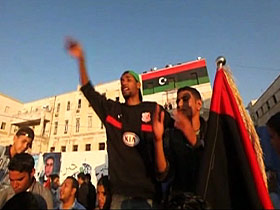 KIM LAWTON (Managing Editor, Religion & Ethics NewsWeekly): And it really did bring up this whole question about when you have a democracy then what is the role of religion? And many countries obviously have been wrestling with this, we wrestle with it, but in Islamic countries that’s a question and how do you form a new government, write a constitution that acknowledges Islam but then what does that mean in terms of the laws and the people and the treatment of minorities and women. And so all of those issues are being debated and people are watching because there are a lot of Muslims countries that, that have been struggling with this issue.
KIM LAWTON (Managing Editor, Religion & Ethics NewsWeekly): And it really did bring up this whole question about when you have a democracy then what is the role of religion? And many countries obviously have been wrestling with this, we wrestle with it, but in Islamic countries that’s a question and how do you form a new government, write a constitution that acknowledges Islam but then what does that mean in terms of the laws and the people and the treatment of minorities and women. And so all of those issues are being debated and people are watching because there are a lot of Muslims countries that, that have been struggling with this issue.
ABERNETHY: And the irony that democracy might lead to a lot of things that we don’t like.
DIONNE: Right and I think Kim put her finger on something, which is you know we’ve had Christian democratic movements in western countries for a long time where there was some kind of linkage with, between religion and the state and yet an acknowledgement of the importance of religious freedom and democracy. There are religious parties inside Israel that compete with secular parties and so the real question, or one of the real questions is whether similar developments will take place in Arab world, in the Arab world and I think and we’ve seen certainly in countries like Indonesia where you can have parties that are Islamic but also democratic.
KEVIN ECKSTROM (Religion News Service, Editor-in-Chief): And I think what’s interesting here at home on the Occupy movement was it’s not a religious movement per say, although there has been religious involvement, but it prompted a lot of really heavy religious and moral arguments about fairness and equity and how we spread wealth or how we hold people accountable. And so there for some fairly profound, I think, moral questions that were raised by the Occupy movement.
ABERNETHY: And E.J. a year ago we were all preoccupied with the Tea Party movement the year passed and we are all preoccupied on the left with the Occupy movement. What happened?
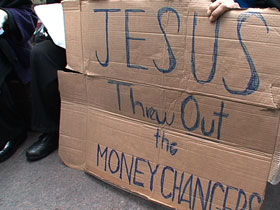 DIONNE: Well I think what the two movements had in common is that a lot of people in the country are unhappy with the results of the economic downturn on the state of the economy right through the 2010 election the inclination, the strongest organizing was on the side that said this is all the government’s fault and we have to tear down government. I think Occupy really changed our political debate in fundamental ways. A lot of people had been talking about rising economic inequality, which has really been happening over a 30 or 40 year period. It took this movement with a certain kind of media savvy to grab all kinds of people’s attention to get all kinds of people including conservatives to talk about what rising inequality means and whether we ought to do something about it.
DIONNE: Well I think what the two movements had in common is that a lot of people in the country are unhappy with the results of the economic downturn on the state of the economy right through the 2010 election the inclination, the strongest organizing was on the side that said this is all the government’s fault and we have to tear down government. I think Occupy really changed our political debate in fundamental ways. A lot of people had been talking about rising economic inequality, which has really been happening over a 30 or 40 year period. It took this movement with a certain kind of media savvy to grab all kinds of people’s attention to get all kinds of people including conservatives to talk about what rising inequality means and whether we ought to do something about it.
LAWTON: I’m intrigued by the amount of religious participation there is in the Occupy movement just as there is in the Tea Party movement. There were a lot of Evangelicals that had some, you know, still do, that have some affinity with the Tea Party. On the religious left there’s a lot of participation, not just with chaplains, which they do have in the, in the movement but, but in, in talking about some of the language and helping behind the scenes with some of the strategy and also in some of the rhetoric that’s being used. You see, you hear things like greed is evil. That’s a moral kind of a calculation you know and inequality and the gap between the rich and poor, that’s wrong, it’s evil. Those are all moral issues and that’s the influence I think of the religious community. African American clergy have joined in on this and want to get more involved and they see it as an extension of the Civil Rights movement.
DIONNE: And this is the 25th anniversary of the Catholic Bishops’ very important statement at the time, economic justice for all. And some of us at Georgetown went back and were talking about this and in a lot of ways that statement from 25 years ago parts of it could be a manifesto for this movement demanding economic justice.
ABERNETHY: But do you hear in all this something that not only protests what we have, but that goes on to say that we ought to change it, fundamentally change the system, the political system, the economic system. Is that in there, too or not?
DIONNE: Well I think the I mean the Occupy movement has been very consciously not about particular demands, some people have criticized them for that, although I think historically a lot of movements change things not by putting up a program but by saying we need to move in a different direction. But I think a lot of these movements are more reformist than they are uh revolutionary.
ABERNETHY: Right.
DIONNE: There’s clearly a lot of frustration with Congress and the way Washington is working, but I still think even some of the more radical elements of some of these movements um are not looking to overturn the system, they just think it needs to be a whole lot better than it is.
ABERNETHY: Yeah. Meanwhile there’s been this amazing campaign on the Republican side for the nomination for president and in that Mitt Romney’s Mormonism comes up as you pointed out Kim in your piece. Is that going to hurt him?
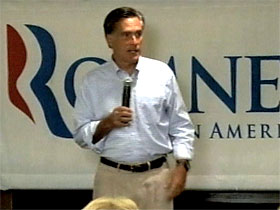 ECKSTROM: I think it will be a challenge for him to get through the primaries. If he can make it through the primaries and gets the nomination and can get to the general election I think it’ll be less of an issue. But I think at this point in the last couple weeks what we’ve seen is that it’s not his Mormonism that’s Romney’s Achilles heel, it’s the conservative distrust of him. And you’ve seen it, you know, Romney has stayed fairly stable in the polls, he never gets above 20, 23% and everyone’s looking for a Plan B or another option but they’re not really falling in love with any of them so I think his problems are more about him and less about his Mormonism right now.
ECKSTROM: I think it will be a challenge for him to get through the primaries. If he can make it through the primaries and gets the nomination and can get to the general election I think it’ll be less of an issue. But I think at this point in the last couple weeks what we’ve seen is that it’s not his Mormonism that’s Romney’s Achilles heel, it’s the conservative distrust of him. And you’ve seen it, you know, Romney has stayed fairly stable in the polls, he never gets above 20, 23% and everyone’s looking for a Plan B or another option but they’re not really falling in love with any of them so I think his problems are more about him and less about his Mormonism right now.
ABERNETHY: What’s been the role of religious conservatives in the republican campaign?
DIONNE: Well I think religious conservatives have been fragmented in this election. I think they kind of wanted to rally behind someone and it’s, their situation is much like that of other conservatives in the party, te- including Tea Party conservatives where a potential champion, for example Rick Perry, who soared in the polls after he got into the race and looked like he might be the person who could unite Tea Party conservatives, religious conservatives and other kinds and then had a whole series of problems and then he sort of collapsed again. Michele Bachmann was a favorite of some of them for a while. Now Newt Gingrich has picked up some of that support. So think that, you know, this election has been different say than the last one where a very large number of religious conservatives rallied behind Mike Huckabee some I think for anti-Mormon reasons but other simple because Huckabee was an Evangelical leader.
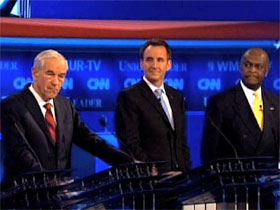 LAWTON: Well, but I think that it took them a while last time around for them to rally behind Mike Huckabee, which was one of his frustrations and that’s been the case this time around too that they haven’t been able to coalesce around one candidate and they are very important in this primary season as we’ve said. Last time around about 40 percent, more than 40 percent of all GOP primary voters were Evangelicals and in early states like Iowa and South Carolina that goes to 60 percent. And so if want to be the GOP candidate, you’ve got to get a significant number of those votes. And yeah, there’s something about that they haven’t done around Mitt Romney. Some of them like Ron Paul so-
LAWTON: Well, but I think that it took them a while last time around for them to rally behind Mike Huckabee, which was one of his frustrations and that’s been the case this time around too that they haven’t been able to coalesce around one candidate and they are very important in this primary season as we’ve said. Last time around about 40 percent, more than 40 percent of all GOP primary voters were Evangelicals and in early states like Iowa and South Carolina that goes to 60 percent. And so if want to be the GOP candidate, you’ve got to get a significant number of those votes. And yeah, there’s something about that they haven’t done around Mitt Romney. Some of them like Ron Paul so-
DIONNE: It’s very interesting the first three states, you’ve got Iowa where the caucuses have a very high white Evangelical participation, then you’ve got New Hampshire which is a somewhat more secular and quite a bit more secular libertarian state and then you go back to South Carolina next which is again a place where Evangelicals are important.
ABERNETHY: 2011 was the 10th anniversary of 9-11, what do we know about U.S. attitudes toward Muslims and how has that changed over this time, Kevin?
ECKSTROM: They haven’t really gotten much better. I think that’s the simple answer. You saw this year about the hearings that Kim mentioned about radicalization on Capitol Hill, the brouhaha we’ve seen in the last couple weeks over a Muslim reality TV show. A lot, the anti-Muslim sentiment actually creeped up a little bit after Bin Laden’s death in May. A lot of people said well if we get rid of Bin Laden maybe people will feel better about Muslims and actually the opposite happened. So things continue to be tense I think what’s been really interesting to watch in the last couple weeks has been this kind of counter backlash to the Muslim reality TV show where Lowe’s, the hardware store, pulled its ads from conservative pressure and now everyone’s threatening to boycott Lowe’s ‘cause they, they don’t think that the show is getting a fair shake and that Muslims aren’t getting a fair shake. So there is a bit of sympathy I think to some degree for Muslims being under attack.
ABERNETHY: What do you make of the efforts going on in many states to whip of fear of Sharia, of Islamic law?
DIONNE: Well you know I think one of the disconcerting things that’s happened in attitudes towards Muslims is that overtime it’s become more of a partisan and ideological issue, which was not the case in the days immediately after 9-11, partly because President Bush made some very strong statements about Muslims being Americans, being our brothers and sisters but now you’ve seen this issue become more politicized so it tends to me in very conservative states, paradoxically often states with very, very small Muslim populations. But I think in a way that we are as a country trying to deal with Muslims as a new reality in our country in much the same way that we dealt with Catholic immigrants a hundred years ago or more as a new reality in our country. My colleagues at Brookings and the Public Religion Research Institute did a poll this year and we found overwhelming support for religious freedom and the rights of minorities – 9 Americans in 10 – but on particular questions about Muslims nearly half were uncomfortable with mosques in their neighborhood, nearly half thought that Muslim and American values are incompatible. A lot of the same things that are said about Muslims were said about Catholics, that Catholics owed allegiance to a foreign power, that they weren’t fully democratic. I take some of these numbers in a more positive way that you see quite a bit of movement toward toleration and embrace, but still some holding back I think it’ll take a long time. Younger Americans are much more open than older Americans.
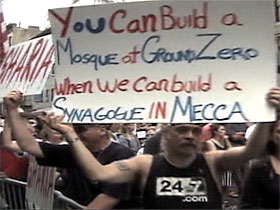 LAWTON: And so much of many Americans views on Muslims and Islam have been tied to the war on terror. And so that’s an additional complication. That also then brings in foreign policy and lots of politics as well. So that’s been a complicating factor that many American Muslims are frustrated about – that they’re broad-brushed with a whole bunch of people around the world that they have nothing to do with.
LAWTON: And so much of many Americans views on Muslims and Islam have been tied to the war on terror. And so that’s an additional complication. That also then brings in foreign policy and lots of politics as well. So that’s been a complicating factor that many American Muslims are frustrated about – that they’re broad-brushed with a whole bunch of people around the world that they have nothing to do with.
ABERNETHY: The last U.S. troops from Iraq have been coming back. What do you make, what do you all make of the welcome that they’ve received and people’s feelings generally about the end of the Iraq War?
LAWTON: I’ve been surprised at the fact that prior to our entry into the Iraq War in the religious community this was a huge debate. Is this a just war? Should we be doing this? There were protests in the streets and now that’s it’s winding down I haven’t heard as much moral conversation from ethicists and religious leaders about what did it all mean now that it’s done and what did we leave behind? People were talking about do we have an ethical responsibility to that country and I don’t hear it being framed in that way and I found that interesting.
ECKSTROM: And I think it’s a very different reception of the troops coming home from Vietnam obviously got and I think a lot of people are happy about that. They’re proud that their veterans are coming home, but I’ve been surprised at how muted the reaction has been. I think along with what Kim has been saying it’s almost like you don’t know that it’s happening out there.
DIONNE: You know I’m struck by how on the one hand the reaction is very different than the reaction of World War II where we had a very clear victory, we announced it. On the other hand it’s also not like a Vietnam where we saw folks evacuated by helicopter from the roof of the embassy. I think Americans decided that they wanted to get out of this war several years ago and the Obama Administration decided that the only way to get out was in a slow and responsible way. So I’m not surprised by the quiet reaction, but you’re absolutely right, it is a reaction to the veterans and an appreciation is so much greater now. We did a terrible job as a country in sort of honoring the service of Vietnam veterans. It took us years to honor what they did for the country.
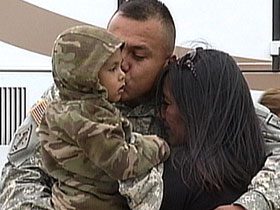 LAWTON: And we have seen a lot of religious involvement in working and ministering to some of these returning troops and you know not only some of those who were wounded physically but emotionally and spiritually, those wounds linger. And so I have seen a lot of religious energy put into that as well.
LAWTON: And we have seen a lot of religious involvement in working and ministering to some of these returning troops and you know not only some of those who were wounded physically but emotionally and spiritually, those wounds linger. And so I have seen a lot of religious energy put into that as well.
ABERNETHY: Kevin it’s been almost 10 years since the terrible scandal broke about the Catholic sex abuse of children. Where does that stand? Bring us up to date on that. What happened this year?
ECKSTROM: Well it had a couple things. One you saw this process enter the criminal justice system, the secular system. So you had a grand jury in Philadelphia indict a top church official for shuffling priests from one place to another. In Kansas City you had the first bishop ever criminally indicted for not reporting a known abuser. The other interesting thing that happened was it spread, in a way to Penn State. You know the church has long argued that it’s not just a church problem, that it’s a problem in schools and in universities and in boys scouts and wherever else. And this was the first big sort of example of that we saw. But what was what I think most interesting was mid-year the bishops put out a long anticipated report on what they called the causes and contexts of this problem, what went wrong basically. And they couldn’t really come up with a simple, you know, decisive answer. What they did essentially was the whole culture got off track in the 60s and the church got really swept up in that. And that’s sort of the big problem that they could point to, but there’s no single cause that they could find.
LAWTON: And the headlines on that were “Woodstock Made Me Do It” made them do it, and of course that’s not what the church wanted for PR.
ABERNETHY: And the media.
LAWTON: Well that was the media too, but still that was what some people took away.
DIONNE: And of course the problem on the scandal was not the 60s culture. I think what it created was a crisis of authority inside the church because a lot of the anger was not simply at the abuse itself as much as there was anger at that, but how long it took for the church to come to terms with it. But again the Penn State thing, the Penn State events suggest a very similar pattern of institutions being slow to respond.
ABERNETHY: What about immigration and the churches? What’s going on there, what’s been going on this year?
ECKSTROM: Well in Alabama you had one of these get tough immigration laws that was passed that took effect and the United Methodist bishop of Alabama.
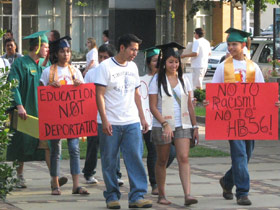 ABERNETHY: And Arizona.
ABERNETHY: And Arizona.
ECKSTROM: And in Arizona, but the Methodist bishop in Alabama said it is the meanest immigration law in the country. There were great fears that it would penalize churches for assisting immigrants whether they’re legal or not. Now certain parts of that law were thrown out and they’re on appeal so the churches right now are in the clear. But there’s a great concern in the religious community that their hands are being tied in their ability to minister to immigrants of one stripe of another.
ABERNETHY: Our time is almost up, but I don’t want it to run out without asking you as you look back on the year, what was the most intriguing story that you saw or one that got the least attention that should’ve gotten a lot more. Who wants to begin? E.J.?
DIONNE: What I was much taken by the Vatican’s Pontifical Commission on Peace and Justice’s critique of the economy that made you wonder is Pope Benedict going to show up at one of these encampments of Occupy Wall Street? Because it was a very tough critique of capitalism. It didn’t say get rid of the market system, but it raised a series of moral questions and I’d like to think and this has happened in other traditions as well, I’d like to think that we can have, at the end of this downturn and serious moral conversation about how you create and just and competitive economic system.
ABERNETHY: Kevin what do you, what do you see?
ECKSTROM: I was really struck by the sale of the Crystal Cathedral in Southern California. You had this institution that went bankrupt and I think it’s a microcosm of sort of the shifts that are going on in the American relig–
ABERNETHY: And It was a symbol of—
ECKSTROM: Protestant dominance. Yeah. And it’s symbolic of the shifts that are going on in the American religious landscape where white mainline aging Protestants are literally losing ground, literally, to Catholics primarily fueled by Hispanic immigration, it’s fascinating.
ABERNETHY: Kim?
LAWTON: I was struck by the number of religious successes I saw in the pop culture world. We had several books on the New York Times bestseller lists about heaven and hell including one that created a huge amount of controversy within the Evangelical community by an Evangelical pastor who had a more expansive view of who’s going to hell. We saw the Book of Mormon on Broadway sweeping the Tony’s. We had a movie called Courageous by a church in Georgia making over 33 million dollars and that’s still making money every day. And you know just stuff like that and of course who could forget Tim Tebow and the Denver Broncos quarterback who make kneeling in prayer a sort of cultural phenomenon, generated a lot of controversy but still got a lot of people talking about the public display of religion.
DIONNE: And he won a lot of games.
LAWTON: Well…
ABERNETHY: Our time is up I’m sorry to say. Happy Christmas and Happy Hanukkah to all our viewers and to Kevin Eckstrom, E.J. Dionne and Kim Lawton. I’m Bob Abernethy.

